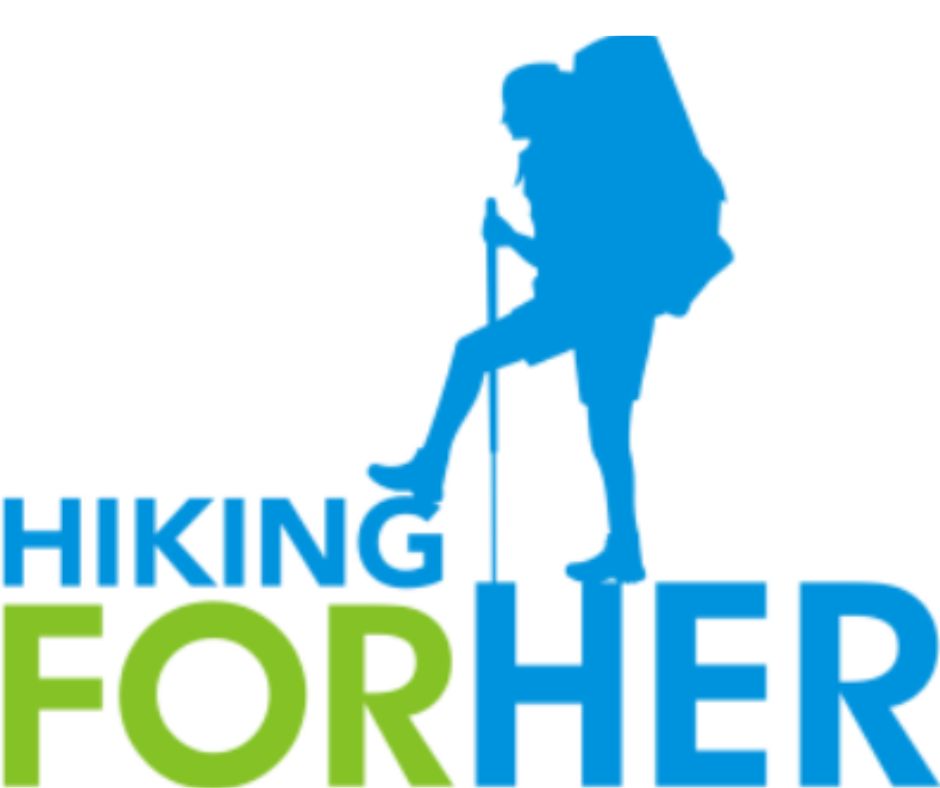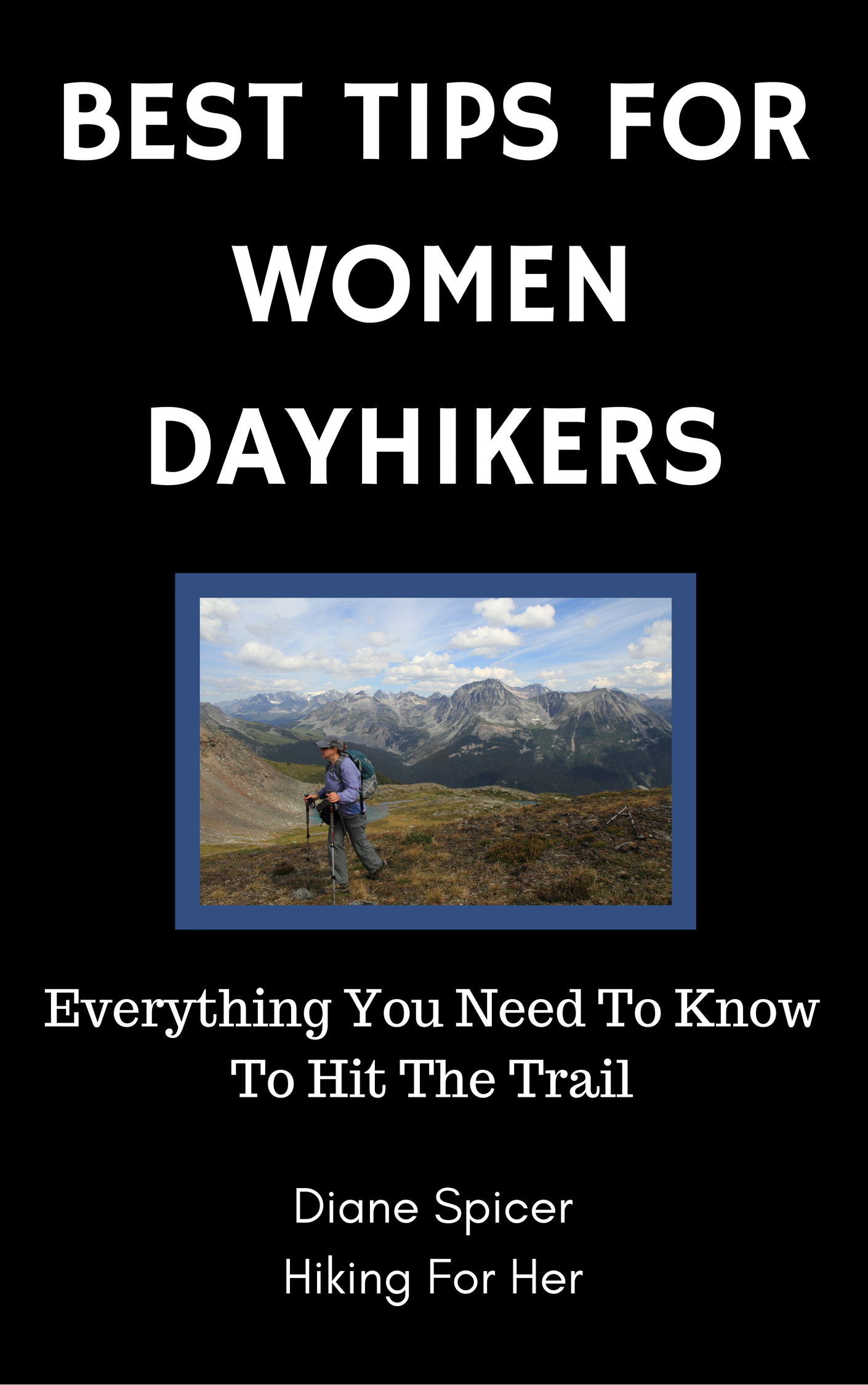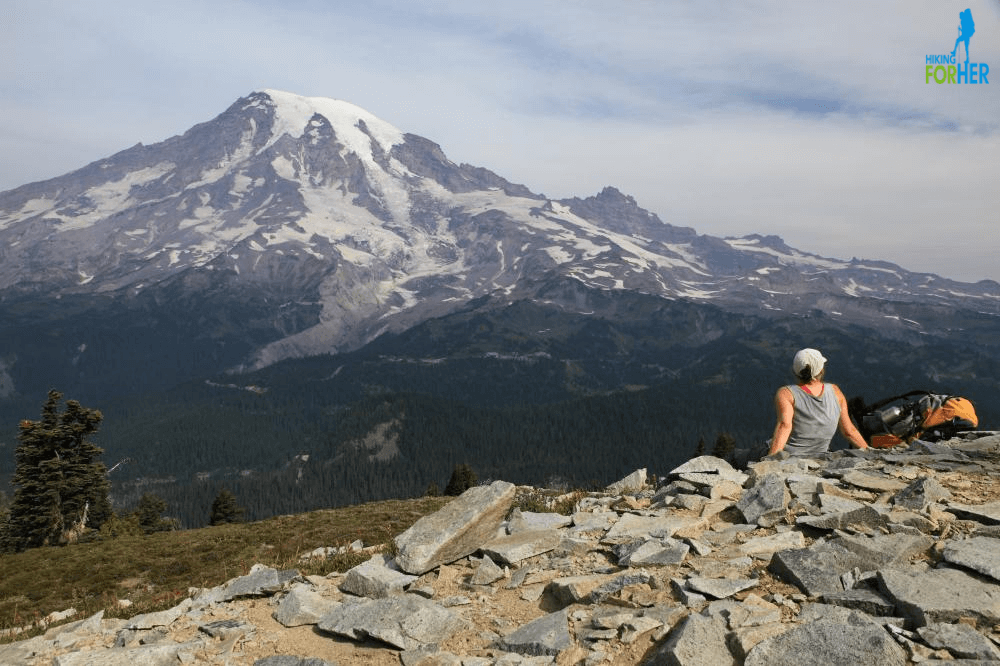Nature Therapy And How To Use It
For Hikers
By Diane Spicer
Nature therapy, anyone?
My hypothesis for suggesting it is that exposure to the outdoors is good for what ails you.
In other words, hiking is good medicine.
Let me explain with a personal example.
Hiking For Her's use of Nature Therapy
Ever since my long term memory kicked in, probably around age 5, I can remember retreating into the woods for recreation and solace.
I was fortunate enough to have a LOT of woods surrounding the house I grew up in, and plenty of neighborhood kids to roam around with.
We built forts, we dug pits and tried to "catch" each other, we carved out "castles" and "prisons" and "homesteads" - whatever adventure book I was reading at the time was the catalyst.
I also went to the woods when I was sad or scared, all by myself.
I had favorite trees to sit beneath, and certain rocks and gullies where I felt peaceful and protected.
I can still see those places in my mind, although I haven't visited them in decades.
Each spring in my childhood, I visited my special places, literally saying hello to the first flowers (spring beauties, trout lilies, trillium, violets).
I spent time with the woods as I would with a person, making time each day in every season to "drop in" and catch up on the news.
In other words, I was completely in love with those woods.
Adulthood nature time
As I grew older, I spent more & more time in urban environments, but I always found a little spot of Nature to visit regularly.
It wasn't a conscious decision, but something that I needed to do for my sanity.
I was using Nature Therapy to deal with my stressful urban existence, I just didn't call it that.
Here's my favorite spot these days where I retreat from daily stresses to observe Nature's cycles.
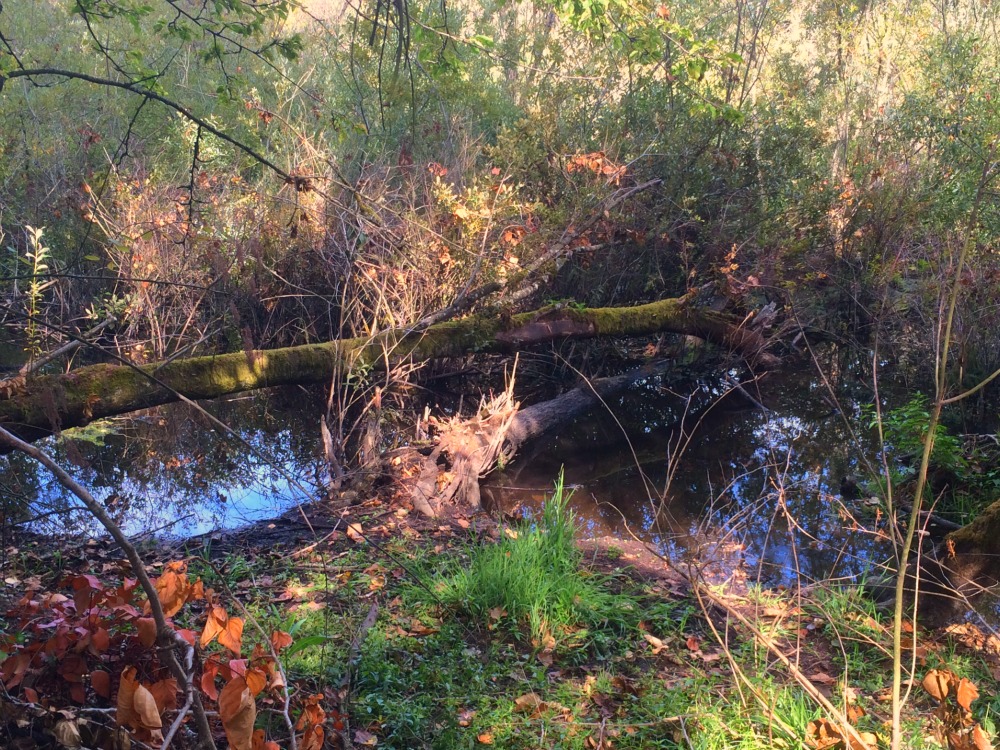 Daily nature therapy: A small pond, bushes and trees to keep me connected with the rhythms of the natural world
Daily nature therapy: A small pond, bushes and trees to keep me connected with the rhythms of the natural world
Why Nature Therapy works
Lately, I've been thinking about why I have always felt the need to seek out and visit untrammeled spots in Nature.
And that led me finally to the intellectual concept of Nature Therapy, sometimes called Nature Cure or Ecotherapy.
I didn't have to look up research to know that it works, because I have 50+ years of my own personal data to know that Nature cures me when I'm sick, or just downhearted.
But being a curious person, I took a peek anyway.
The first thing I did was look to see if other people experience a therapeutic relationship with Nature.
In other words, was it just me, or a widely distributed need?
- Going back in history, was there evidence of people realizing that living encased in 4 walls (houses, offices, cars) was robbing them of Nature Therapy?
Here's a piece of evidence I uncovered, written by Adolf Just in 1903:
"Men who no longer listen to the voice of nature become the victims of a thousand different diseases and miseries."
- In other words, use Nature Therapy or risk body and/or soul sickness.
On the right track!
That's as far as I had to go to feel convinced that I am on the right track when I turn to hiking as a cure for what ails me.
I use my own intuition about when I need to be outdoors, and I juggle my schedule so that I can take long daily walks in a nearby state park - until the week-end rolls around and I can log some serious trail time.
Read any of the "nature boys" (as I affectionately call Leopold, Thoreau, Emerson, Muir), and you'll find that human beings deeply long to be away from the cares and worries of "civilized" life.
Nature Therapy is intrinsic to our humanness.
Your body's reaction to stress
Another piece of the puzzle comes from a biologic perspective. It's an idea that I first learned about during my training as a naprapath: the General Adaptation Syndrome, proposed by Hans Selye.
I'll try to make this explanation brief.
Your body evolved in a natural setting - no skyscrapers, no cars, no computers in sight "way back when". The stresses each human faced were immediate and natural: hungry predators, crossing fast moving water, hunger and thirst.
Your brain (conscious thought, decision making ability) is connected to your endocrine system (hormones as chemical messengers between brain and other organs) by something called the HPA axis.
It's named for the structures in those two areas which "talk" chemically:
- H for hypothalamus (brain structure)
- P for pituitary (hormonal gland in brain)
- A for adrenal gland, which is a chunk of endocrine tissue which spews out hormones from its perch atop each kidney
The HPA axis is a system which deals with stress.
Hundreds of years ago, stress came out of nowhere, was resolved, and then your body went back to baseline.
Not so much anymore.
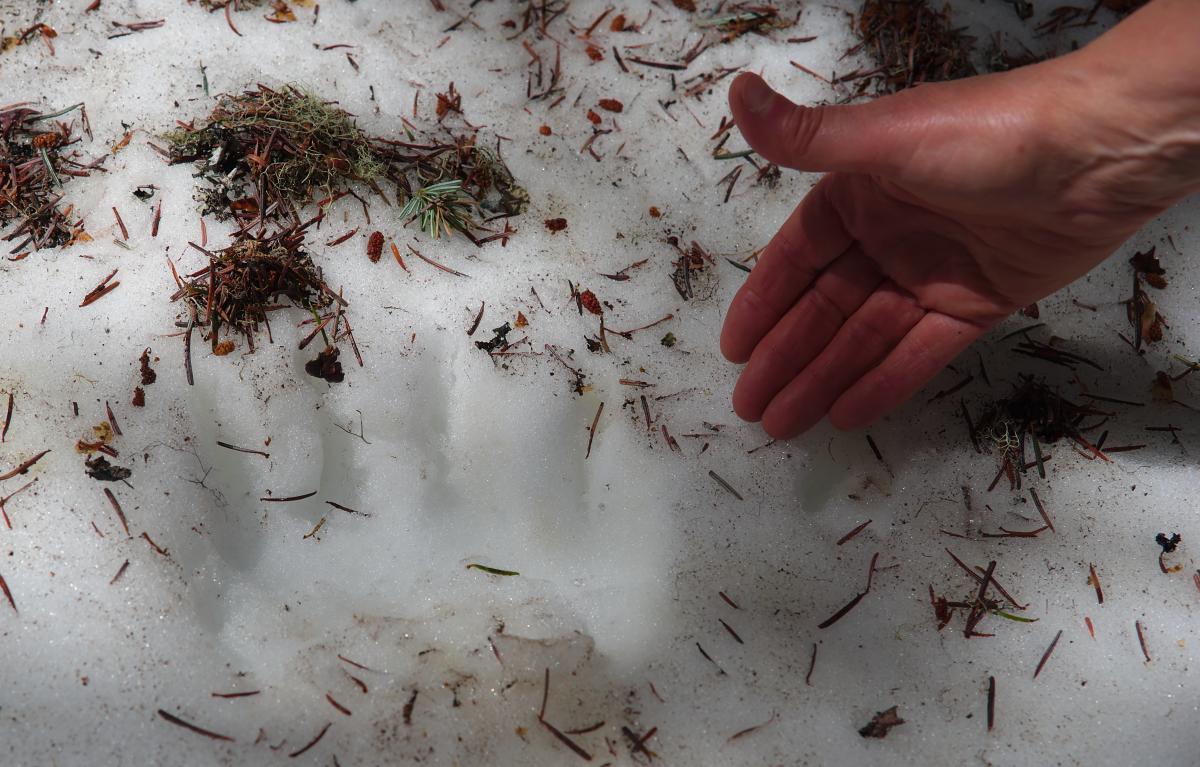 Finding a fresh bear track can be a stressful event on a hike
Finding a fresh bear track can be a stressful event on a hikeExample of HPA axis
A huge hungry saber tooth tiger leaps off a rock onto your shoulder - or tries to.
It's a near miss.
You either run away (flight) or clobber the cat with a nearby rock (fight).
Either way, your bloodstream is flooded with stress hormones to help you deal with the immediate situation.
Once the cat is a goner (because you left it behind, or you are busy skinning it), the hormones leave your bloodstream.
You're back to baseline.
But it never goes away
Today, stress is chronic.
We are bombarded by messages, lights, noises, signals, needs, wants, demands, obligations - they never stop!
So our HPA axis works overtime to deal with all of this accumulating dis-ease.
That's where Nature Therapy comes in.
Hiking is good medicine!
Have you ever had this experience?
You're stressed out, your neck muscles are so tight they feel like they are going to snap, your head aches, and you want to crawl under the nearest rock - and then you get the bright idea of walking out of the building (or getting out of the car).
You take your own good advice.
You stroll along a tree lined street, or sit in a nearby garden or park, or maybe you just plop your weary body down into a chair next to a potted plant.
Ahhhh...... you can let out your breath, you can reconnect with who you are and why you are doing whatever it is you're doing that stresses you out. (Pick one: kids, job, relationship, school.)
In the inbuilt wisdom of your body, you sought out what you needed to cure your ailments - or at least alleviate them temporarily, until you can learn some stress management techniques.
So now do you understand why I hike every week? And walk every day I'm not on the trail?
It brings balance and health into my life!
For me, hiking truly is the best medicine on the planet.
It's cheap, low impact, silent, healthy, and it feels so good when I stop (kidding).
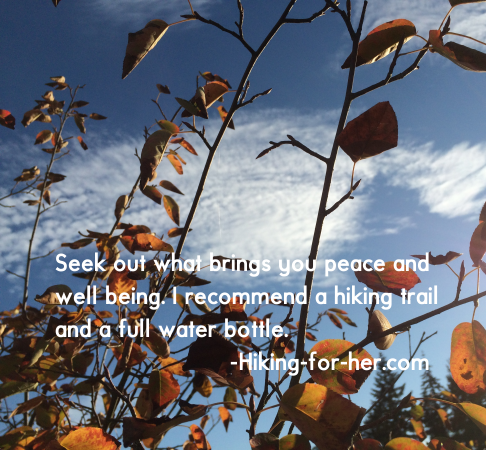
Is solo hiking the answer?
Here's another aspect of hiking which you should consider if you are seeking some deep healing Nature Therapy.
Hiking solo is one of the best kept secrets for self discovery and serenity.
So what are you waiting for??
Lace up a pair of boots.
Throw the ten essentials and a tasty, nutritious lunch into a back pack.
Soak up a good healthy dose of Nature Therapy.
Oh, and please don't forget to work toward preserving our natural spaces so everyone has access to Nature Therapy.
- Pick an organization to work with.
- Pick a local or regional cause to preserve wild spaces.
- Pick a way to donate (money, time, services, expertise).
It feels so good to keep our Mother healthy.
One more thing!
For times when you're stuck inside, but still want to balance your being, take a look here.
P.S. Get the kids in your life out into the woods, or risk Nature Deficit Disorder.
Don't have kids? Volunteer in a youth organization and show kids how much fun it is to hike.
Nature Therapy
|
I get emails all the time about what I wear, eat, carry and love to use on the trail. That's
why I provide affiliate links to you: the best gear that I use myself and have seen used by other hikers is instantly
available for your consideration, and the gear company sends a few
pennies per dollar to this reader-supported hiking website. There is no added cost to you! Everyone ends up a winner: Great gear for you, strong gear companies, and more free hiking tips for everyone. Thanks very much for your support. It's warmly and sincerely appreciated. It also helps send these hiking tips to all your virtual trail buddies around the globe. |
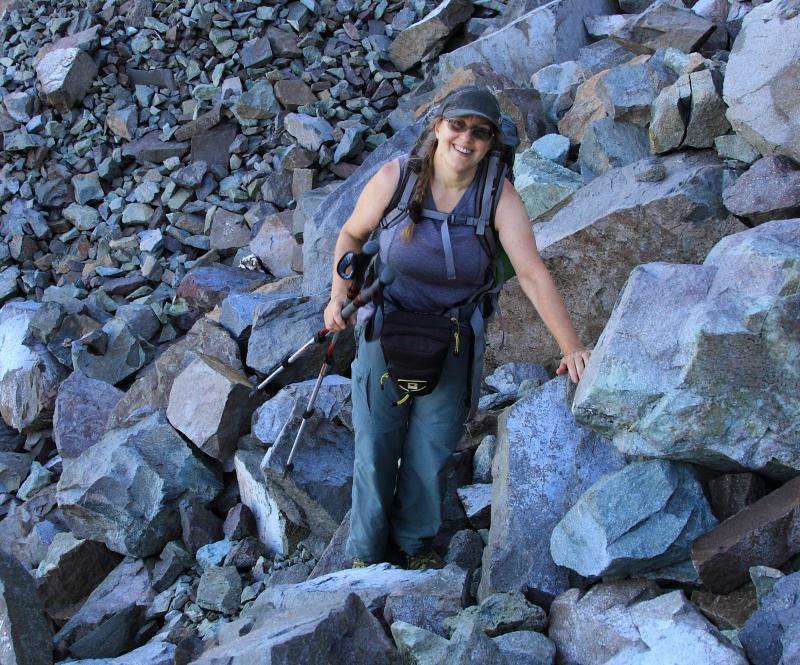 |
